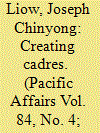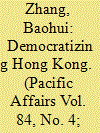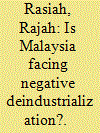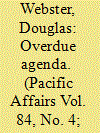|
|
|
Sort Order |
|
|
|
Items / Page
|
|
|
|
|
|
|
| Srl | Item |
| 1 |
ID:
108797


|
|
|
|
|
| Publication |
2011.
|
| Summary/Abstract |
This article examines the differing meanings of volunteering that underlie the management of volunteers in diverse cultural contexts by analyzing a case study of an Australian non-government organization (NGO) working in Papua New Guinea (PNG), where local volunteers are engaged in a number of its programs. The results indicate that gift-exchange theory may be a fundamental influence shaping attitudes towards volunteering by PNG nationals. This has led to the development of a gift-exchange model to assist other Western-based NGOs to manage formal volunteering in Pacific nations in a way that is both effective and culturally appropriate.
|
|
|
|
|
|
|
|
|
|
|
|
|
|
|
|
| 2 |
ID:
108796


|
|
|
|
|
| Publication |
2011.
|
| Summary/Abstract |
Since the 1999 general elections, when it emerged with the most impressing performance in Malaysian political history, the Pan-Malaysian Islamic Party, or PAS, has elicited significant scholarly attention. This has resulted in the production of a wealth of information about the party's origins and evolution. Yet, while most observers of Malaysian politics note that, next to UMNO, PAS is the most organized and well-resourced political party in the country, there remains a dearth of knowledge about the internal workings of PAS, and specifically, how the party developed, maintained and mobilizes its impressive machinery. This paper aims to unpack the puzzle of the nature of PAS's mobilization by studying the party's youth wing (also known as PAS Youth). Through the conceptual framework of resource mobilization theory and a detailed study of milestone events in the party's recent history, the paper argues that the youth wing has played a pivotal role in defining the party's identity as well as its political triumphs. At the same time, however, its integral role within PAS has meant that the challenges confronting the parent party have undoubtedly rebounded upon them as well.
|
|
|
|
|
|
|
|
|
|
|
|
|
|
|
|
| 3 |
ID:
108795


|
|
|
|
|
| Publication |
2011.
|
| Summary/Abstract |
The system of functional representation constitutes the greatest challenge to political reform in Hong Kong. Utilizing recent developments in institutional and ideational theories in political science, this article explores how both power and ideas shape the politics of reforming functional representation. The impasse generated by the current balance of power has given rise to a plethora of ideas that seek to reform the system while preserving its place in the political process. However, recent direct negotiations between Beijing and moderate democrats in Hong Kong have triggered a significant political realignment. This shift in the political balance of power has generated new scenarios for the reform of functional representation.
|
|
|
|
|
|
|
|
|
|
|
|
|
|
|
|
| 4 |
ID:
108798


|
|
|
|
|
| Publication |
2011.
|
| Summary/Abstract |
This paper seeks to examine whether Malaysia is facing negative deindustrialization by examining value-added, trade and productivity trends over the period 1990-2005. The evidence produced in the paper is concrete enough to confirm that Malaysia is facing negative deindustrialization. While it is typical, as part of the process of structural change, to see a rise and fall in the share occupied by manufacturing in the GDP, the evidence shows that Malaysia is indeed facing premature deindustrialization with a trend slowdown in manufacturing value-added, trade performance and productivity since 2000. Not only has the trade performance of manufacturing been falling, manufacturing labour productivity has also slowed down, with the key sectors such as electric-electronics, textiles and transport equipment showing either negative or low productivity growth since 2000. Malaysian industrial policies have been fairly successful in connecting with the global value chains of multinationals and in developing resource-based industries, but have not achieved the same success in stimulating their transformation to high value-added activities. The lack of effective institutional change, partly explained by ethnic policies, is advanced as the prime reason for the setting in of negative deindustrialization in Malaysia.
|
|
|
|
|
|
|
|
|
|
|
|
|
|
|
|
| 5 |
ID:
108794


|
|
|
|
|
| Publication |
2011.
|
| Summary/Abstract |
Peri-urbanization in East Asia, the complex and "messy" process whereby new urban land is created on the periphery of cities, is still poorly understood. Professor Douglas Webster's review indicates that research on the phenomenon is highly fragmented among land use change detection analysts, sustainability scholars, institutional experts and community oriented scholars; the result is that fast-paced change on the ground driven by accelerating economic structural change in East Asia is outpacing our understanding of the dynamic.
|
|
|
|
|
|
|
|
|
|
|
|
|
|
|
|
|
|
|
|
|